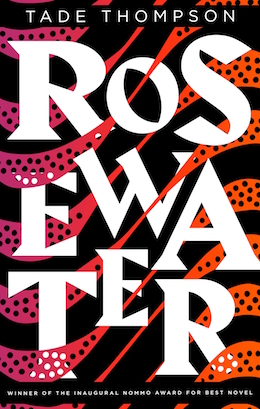Rosewater is award-winning author Tade Thompson’s second novel. A science fiction novel—part near-future thriller, part post-first-contact story—set in Nigeria, it’s a fast, tense, pacy, interesting book. First published in 2016 by a small press outfit, it’s now been picked up by Orbit and given a wider release as the opening volume of a trilogy.
At first glance, Rosewater’s setting, its mixture of mysticism and science, and its overall themes—communication, trust, the unknowable alien and irreversible transformations—recalls the work of another award-winning author of Nigerian extraction: Nnedi Okorafor’s acclaimed Lagoon (Hodder, 2014; Saga Press, 2016). But in terms of structure, characterisation, and tone, Rosewater’s an entirely different beast. It reminds me a little of Elizabeth Bear’s Jenny Casey trilogy, and a little, too, of Ian McDonald. It’s not really into soft edges.
An alien biodome established itself in Nigeria in the 2050s. By 2066, the year in which Rosewater’s narrative opens, a significant town has grown up around it—a town called Rosewater—with public transport, parking fines, a mayor, every indicator you could want of a healthy community. Once a year, the biodome opens, briefly, and people in the vicinity are healed of their ailments, or changed, or in the case of the nearby dead, brought back to life without mind or the capacity for thought. Since the arrival of the alien (originally to London, where it destroyed Hyde Park and was met with violence), the air on Earth has been saturated with xenoforms, microscopic things that bind to human nerve endings.
Kaaro is a “sensitive,” one of a number of people who—thanks to the xenoforms—can read the thoughts and emotions of other people. Kaaro is a finder, capable of finding anything as long as he can read someone who misses it. He currently works—reluctantly, unwillingly—for Section 45, part of the Nigerian secret police/intelligence services, while moonlighting for a bank. When he develops a relationship with a woman, Aminat, his relationship with his employers goes even further downhill, especially when he learns that his longtime boss has been pushed out because of politics. Then he learns that sensitives like him have been dying, and that he might be the last one left.
Rosewater’s narrative hops back and forth across the decades—the 2040s, the 2050s, and 2066. Gradually, it builds up a picture of Kaaro and his world: an unrepentant, amoral thief in the 2040s, later stumbling into the secret services because they found him, and found him useful, and then wouldn’t let him go. He was inside the alien dome, once. He was there when it was raised. With measured skill, the narrative builds towards revelations: what Kaaro really cares about, the truth about his lover, what really happened when Kaaro was inside the biodome, and why sensitives are dying—and hints at what the aliens may really want.
Thompson is a talented writer with a gift for voice and characterisation. Our protagonist, Kaaro, is Rosewater’s narrator, and his first-person account is full of personality. Thompson makes him a concrete individual with a definite presence, and whether or not a reader will enjoy Rosewater will depend in large part on whether or not they enjoy spending time in Kaaro’s head. Let’s be honest. Kaaro is an asshole. An appealing asshole, but definitely an asshole. More than slightly sexist, selfish, more often than not a physical and moral coward, Kaaro is still a compelling character, and that says a lot for Thompson’s skill.
The layered narrative across the decades mostly works well, except for a handful of occasions where it proves a little confusing. My one real complaint about Rosewater is that all its climaxes peak at once, in an orgy of tension and revelation: a little more breathing room or build-up might have led to a smoother conclusion.
Rosewater’s pretty damn good, though, and uses its setting to good effect. It’s rooted in place, and while Rosewater is an imaginary place, it still feels solidly real. It’s as much a character as Kaaro is, and I look forward to seeing what Thompson does with it next.
Rosewater is available from Orbit Books.
Buy the Book


Rosewater
Liz Bourke is a cranky queer person who reads books. She holds a Ph.D in Classics from Trinity College, Dublin. Her first book, Sleeping With Monsters, a collection of reviews and criticism, was published in 2017 by Aqueduct Press. It was a finalist for the 2018 Locus Awards and was nominated for a 2018 Hugo Award in Best Related Work. Find her at her blog, where she’s been known to talk about even more books thanks to her Patreon supporters. Or find her at her Twitter. She supports the work of the Irish Refugee Council, the Transgender Equality Network Ireland, and the Abortion Rights Campaign.










